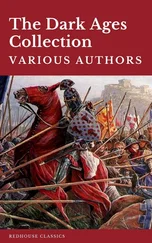Among the thinkers of the Middle Ages the influence of Augustine’s work went far and deep. But his fruitful conception was lodged in a somewhat dreary mansion. If the polemical section which he intends to be a preliminary defeat of the enemies of the City of God 95had been omitted, the work would have gained in simplicity. But the main argument itself, although it has a definite architectural scheme, 96is marred by diffuseness and digressions. Augustine did not possess the literary art or command the method of lucid exposition whereby the prince of Greek philosophers compels his readers to assist in the building of the City, “of which a model perchance is in heaven,” with breathless interest from page to page and from section to section. There is at least one part which may hold the attention of the reader, fascinated by the very horror, the Book in which this arch-advocate of theological materialism and vindictive punishment expends all his ingenuity in proving that the fire of hell is literal fire and spares no effort to cut off the slenderest chance that the vast majority of his fellow-beings will not be tormented throughout eternity.
Augustine had produced a book which transcended in importance its original motive. But it is this motive which concerns us here. It was to teach the world to take a right view of the misfortunes which were befalling the Empire, and to place them in their true perspective. He says in effect to the pagans, “These misfortunes are nothing exceptional, they are simply part of the heritage of your City of sin and death.” 97To the Christians he said, “These things do not really concern you. Your interests are not affected by the calamities of a country in which you are merely foreigners.” This theory might be consolatory, but if it were pressed to its logical conclusion it would assuredly be destructive of the spirit of patriotism; and, though the author would doubtless have deprecated this criticism, he does not consider the secular duties of Christians towards the state of which they are citizens in the earthly sense.
He was conscious that his treatment of the history of Rome was casual and superficial, and he thought that a fuller development of his historical argument in reply to the pagans was desirable. He requested his friend Orosius, a Spanish priest, to supply this need. He said to Orosius, “Search the annals of the past, collect all the calamities which they record, wars, plagues, famines, earthquakes, fires, and crimes, and write a history of the world. Thus my general refutation of the charges of the unbelievers who impute to our religion the present misfortunes, which they allege to be unusual, will be proved abundantly by a long array of facts.” 98A work entitled Histories to confute the Pagans was the outcome of this request, and it may thus be regarded as a sort of supplement to the City of God. 99Perhaps it deserves more than any other book to be described as the first attempt at a universal history, and it was probably the worst. But it had considerable vogue in the Middle Ages, and gave currency to the idea of four great monarchies, the Babylonian, Carthaginian, Macedonian, and Roman, corresponding to the four points of the compass. 100
Fifteen or twenty years after the completion of Augustine’s work Salvian, a priest of Marseilles, wrote his treatise On the Government of God , 101dealing from a different point of view with the same problem which had suggested the books of Augustine and Orosius. Salvian addresses his discourse expressly to Christians, for he has no hope that his arguments would have any effect upon pagans. 102He propounds the question: How comes it that we Christians who believe in the true God are more miserable than all men? Is God indifferent to us? Has he renounced the business of governing the world? If he regards human affairs, why are we weaker and more unfortunate than all other peoples? Why are we conquered by the barbarians? Salvian’s answer is, We suffer these evils because we deserve them. If, living in such vice and wickedness as we do, we flourished and were happy, then indeed God might be accused of not governing. In support of his argument the author paints an appalling picture of the condition of the Empire. His descriptions of the corruptness of the administration and of the oppression of the poor by the rich furnish the modern historian with an instructive commentary on those Imperial laws which attempt to restrain the rapacity of public officials. Salvian does not forget to dwell, with the zeal of a churchman, on the general love of unedifying pleasures, the games of the circus and licentious plays in the theatre, amusements of which the average Christian was not less avid than the average pagan.
But, it might be objected, we, whatever our faults, have at least right theological beliefs, whereas the barbarians who are permitted to overcome us are heathen or heretics. That is true, replies Salvian; in just one point we are better than they; but otherwise they are better than we. He then proceeds to enlarge on the virtues of the barbarians, which he uses, somewhat as Tacitus did in the Germania , as a foil to Roman civilisation. Among the Germans, or even among the Huns, we do not see the poor oppressed by the rich. If the Alamanni are given to drunkenness, if the Franks and Huns are perjured and perfidious, if the Alans are rapacious, are not all these vices found among us? On the other hand, the Vandals have put the provincials to shame by their high standard of sexual morality, and if the Saxons are ferocious and the Goths perfidious, both these peoples are wonderfully chaste.
There is no relief in Salvian’s gloomy picture. It must be accepted with the reserves with which we must always qualify the rhetoric of preachers or satirists when they denounce the vices of their age. But the tone of despondency is genuine. He says that “the Roman Republic is either dead, or at least is drawing her last breath in those parts in which she still seems to be alive.” 103He speaks as if this were a fact which was beyond dispute and to which men had already become accustomed. More than thirty years had elapsed since the news of the Goths at Rome had surprised Jerome in his retreat at Bethlehem and extorted the cry, Quid salvum est si Roma perit? Meanwhile the Romans had quickly recovered from the shock and had almost forgotten it. The calamity of the provinces did not move them to alter their way of life or renounce their usual amusements. And the one phrase that is worth remembering in Salvian’s gloomy, declamatory book is the epigram on Rome, Moritur et ridet .
§ 7. Modern Views on the Collapse of the Empire
The explanations of the calamities of the Empire which have been hazarded by modern writers are of a different order from those which occurred to witnesses of the events, but they are not much more satisfying. The illustrious historian whose name will always be associated with the “Decline” of the Roman Empire invoked the “principle of decay,” a principle which has itself to be explained. Depopulation, the Christian religion, the fiscal system have all been assigned as causes of the Empire’s decline in strength. 104If these or any of them were responsible for its dismemberment by the barbarians in the West, it may be asked how it was that in the East, where the same causes operated, the Empire survived much longer intact and united.
Consider depopulation. The depopulation of Italy was an important fact and it had far-reaching consequences. 105But it was a process which had probably reached its limit in the time of Augustus. There is no evidence that the Empire was less populous in the fourth and fifth centuries than in the first. 106The “sterility of the human harvest” in Italy and Greece affected the history of the Empire from its very beginning, but does not explain the collapse in the fifth century. The truth is that there are two distinct questions which have been confused. It is one thing to seek the causes which changed the Roman State from what it was in the best days of the Republic to what it had become in the age of Theodosius the Great — a change which from certain points of view may be called a “decline.” It is quite another thing to ask why the State which could resist its enemies on many frontiers in the days of Diocletian and Constantine and Julian suddenly gave way in the days of Honorius. “Depopulation” may partly supply the answer to the first question, but it is not an answer to the second. Nor can the events which transferred the greater part of western Europe to German masters be accounted for by the numbers of the peoples who invaded it. The notion of vast hosts of warriors, numbered by the hundreds of thousands, pouring over the frontiers, is, as we saw, perfectly untrue. 107The total number of one of the large East German nations probably seldom exceeded 100,000, and its army of fighting men can rarely have been more than from 20,000 to 30,000. They were not a deluge, overwhelming and irresistible, and the Empire had a well-organised military establishment at the end of the fourth century, fully sufficient in capable hands to beat them back. As a matter of fact, since the defeat at Hadrianople which was due to the blunders of Valens, no very important battle was won by German over Imperial forces during the whole course of the invasions.
Читать дальше












